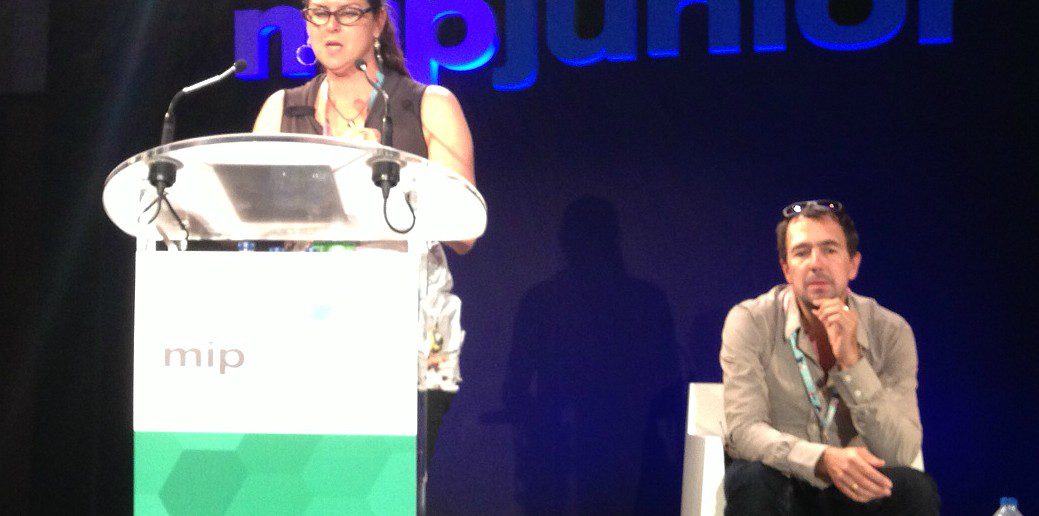Watch full MIPJunior sessions on mipcom.com now! (email req.)
The final session of MIPJunior focused on more digital kids, this time with Dutch digital production agency MediaMonks and Australian creative services company The Feds. They talked about their experience working on teen-focused shows.
Lizzy Nash, executive producer at The Feds (photo), talked about Stay Tuned, an interactive music show on ABC 3 in Australia. « They wanted to engage the digital audience as well as entertain the passive viewer, » said Nash of the show, which was aimed at under-13s – thus ruling out use of social networks like Facebook.
The Feds started by interviewing hundreds of teenagers about existing music TV shows. « Our audience wasn’t happy with local current music TV. They are creative, intelligent and opinionated kids, and they want to be heard, » she said.
Stay Tuned was thus born as a show where its young viewers were in control. It had 30 half-hour episodes, each with 15 minutes of content interspersed with video clips, with hosts responding to online questions as they present. Each episode is driven by a question asked by the Stay Tuned audience.
There’s also a website with weekly video blogs, exclusive videos, a music quiz game, voting on which clips should be aired, and previous episodes available on-demand. « We’re not telling the kids what to think or listen to. We’re being told by them. »
The Feds found that only 15-20% of the TV audience interacted online, and there weren’t as many submissions or interaction initially as had been hoped for. But the company did learn that the two-way interaction between the hosts and the viewers was crucial for helping this grow.
« The hosts became an essential gateway of communication between the kids and the show, » said Nash, who reminded the audience that for all the digital innovation, it was vital to make sure the actual TV show was entertaining in its own right.
Other hurdles included ABC’s national broadcast editorial guidelines, which restrict artists from promoting their albums and tours on the show. Stay Tuned missed out on some big-name bands as a result, but others jumped at the chance to be asked questions by fans.
« To sum up… to make a successful TV programme for digital kids, we believe you need to make it not just for the kids, but with the kids. So listen to them, » said Nash. « While it may take a leap of faith, don’t be afraid to let them drive the show. »
Over to MediaMonks. CEO Victor Knaap kicked off, explaining that the company has 170 staff, and it works with broadcasters and producers to turn IP into digital extensions. Games, websites, social media and so on.
It made a second-screen app for Expedition Robinson, an interactive experience for Viacom’s Legend of Korra in the US, and Teenage Mutant Ninja Turtles content too. Knaap’s colleague Wesley ter Haar talked about another project, for The House of Anubis.
It’s a Viacom/MTV/Nickelodeon soap, with the project starting around four years ago. « There was a game before we started, which was horrible, » said ter Haar. MediaMonks’ job was to make something better.
The result was an online game where fans of the show can solve mysteries with their own team of characters – avatars of the stars of the show itself. It launched in several European countries, including the Netherlands, Belgium, Germany, Switzerland and Sweden.
And now the US, with a brief to be « bigger, better, cooler » with more side-quests to expand the virtual world. « Kids are very savvy when it comes to digital, and they have very high expectations, » said ter Haar. « It needs to have the same kind of quality [as its parent show]when it comes to production, and the same kind of quality when it comes to storytelling. »
What did the company learn from the experience? « You really need to open up or support channels for kids to talk and influence your work, » he said. « They will be talking about your work anyway, so the best thing is to be in there with them. »
ter Haar also said that working closely with the show’s originators was important, down to sitting in on script reviews. And he said that timed rollouts of new levels and puzzles worked really well.
« Do not be afraid to create separate adventures or storylines, but make sure you connect it back to the show, » he continued. « It’s important to expand, not just copy. »




